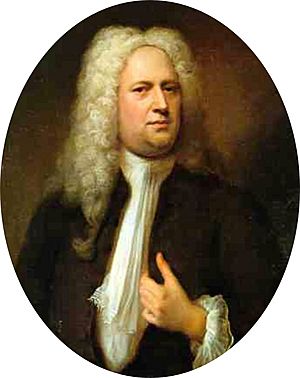William Savage facts for kids
William Savage (born 1720 – died July 27, 1789) was an English composer, organist, and singer from the 18th century. He was quite special because he could sing in many different voice types! He started as a boy treble (a high boy's voice) and alto, then became a countertenor (a high male voice), and finally a bass (a low male voice).
William Savage is best known for working with the famous composer George Frideric Handel. Savage sang in many of Handel's big musical stories called oratorios.
Life and Music Journey
William Savage married Mary Bolt (1718-1788). They had three children together. Sadly, their son William died young. Their other son, Rev. George Savage, passed away in 1816. Their daughter, Jane Savage, also became a composer, just like her dad! Mary, William's wife, was also a writer and published two books of her own poems in 1777.
Singing for Handel

William Savage first became famous in 1735 when he was just a boy. He sang as a boy treble in a new performance of Handel's Athalia. He also sang in Handel's opera Alcina during the composer's time at Covent Garden. The part of Oberto in Alcina was actually written just for Savage's voice! Handel added it to the music later so that Savage could sing it.
After his voice changed as he grew up, he continued his singing career. First, he sang as an alto or countertenor. Later, his voice became even lower, and he sang as a bass.
As a countertenor, he might have sung smaller parts in Handel's operas like La Fortuna in Giustino (1737) and Childerico in Faramondo (1738). He also sang in the very first performance of Israel in Egypt (1739).
When he became a bass singer, he created important roles. He sang the main part in Handel's opera Imeneo (1740). He also played Fenice in Deidamia (1741) and Manoa in the first show of the oratorio Samson (1743).
People who heard him sing often praised his voice. A music expert from the 1700s, Charles Burney, said Savage had a "powerful and not unpleasant bass" voice. One of Savage's students, R. J. S. Stevens, gave an even nicer description. He said Savage had a "pleasant voice of two octaves" (meaning he could sing a wide range of notes). Stevens also mentioned that Savage sang with "clear articulation" (you could understand every word), "perfect intonation" (he sang every note perfectly in tune), and "great volubility of voice" (he could sing very quickly and smoothly).
Career Highlights
William Savage had a busy and successful career. In 1740, he became the organist at Finchley Church. Then, in 1744, he joined the Chapel Royal's choir as a bass singer.
In 1748, he got a very important job at St Paul's Cathedral. He became a Vicar Choral, Almoner, and Master of the Choristers. This meant he helped lead the choir and teach the young singers. He had a big influence on many talented musicians who came after him.
In 1777, he moved to Kent and retired. However, he came back to London in 1780 to teach music. He stayed in London until he passed away there.
Some of the music that William Savage owned was later given to the Royal Academy of Music. This happened after his student, R. J. S. Stevens, died in 1837. This collection included a piece called Gloria, which was discovered to be a work by Handel only in 2001!
William Savage as a Composer
Besides being a great singer and organist, William Savage also wrote music. He composed many anthems (songs for church choirs) and other church music. His anthem "O Lord my God" is considered his most important work. It was written to be played with a string orchestra.
He also wrote music for solo violin. He composed different kinds of fun, short songs like canons, catches, and rounds. He wrote these for a group called the Noblemen and Gentlemen's Catch Club, which he was a member of.
One of his more unusual pieces was called "On the very first of May." The words for this song were actually nonsense poetry written by his wife!
 | Calvin Brent |
 | Walter T. Bailey |
 | Martha Cassell Thompson |
 | Alberta Jeannette Cassell |

